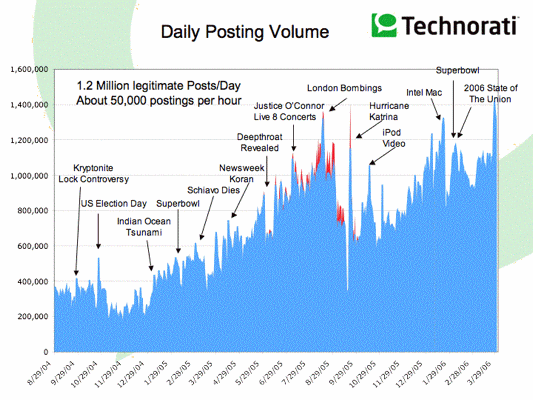Thank You Robin Good for this excellent piece:
Prentice Hall Professional, in an article of last October entitled "The Search Lurch: Have We Become Lazy Googlers or Smarter Web Researchers?" asked four highly accredited online search and web usability professionals Jakob Nielsen, Jesse James Garret, Gerry McGovern and Tara Calishain, their thoughts on "how our search habits are changing Web culture and even changing the way Web sites are being designed and maintained."
The questions presented to these experts focused on understanding whether the increased use of search engines as the fastest means to get to any information seeked should influence and modify the way contents and navigation elements inside web pages are designed.
Without looking at the answers provided by my much more qualified colleagues, I felt compelled to contribute and extend their interesting conversation by providing my own views and recommendations for online publishers curious to learn where to place their limited resources next.
These the questions:
1) As the power and influence of search engines such as Google increase, will Web users bother going to homepages and trying to figure out each site's navigation scheme? Or with our increasingly shortened attention spans and demands on our time, will we just Google everything?
2) Do you think it's futile for site designers and information architects to struggle with developing effective navigation schemes for their sites? In other words, is search engine optimization becoming more important than navigation optimization?
3) On the premise that Web users are already Googling more, navigating less, what would you recommend to site designers to make their sites more usable and searchable right now?
Here my answers:
Question: As the power and influence of search engines such as Google increase, will Web users bother going to homepages and trying to figure out each site's navigation scheme?
Robin Good: Or with our increasingly shortened attention spans and demands on our time, will we just Google everything?
Habitual web users already don't navigate back to your home page MOST of the time. That is what the stats say on my own half a million monthly visitors. They land on a specific article and they take that as the full embodiment and key access to all of your web site. If you hadn't yet figured this one out, it's indeed time to do something about it.
When users come to your web site, it is generally because someone has directed them to read something specific you have written or published or a major search engine has provided them with a result linking directly to your page.
So, the user arrives at your site and learns about its related content and about other relevant sections mostly from the very page that they land on.
This is the main reason why, each individual article page should be designed to provide strong focus on the topic/issue covered while at the same time facilitating user navigation, exploration and discovery of other complementary and relevant sections on the same site.
Users, will increasingly bother less and less with going proactively to your site home page to learn more about your content and initiatives. Unless you provide extremely effective complementary navigation and content features (related articles, comments, etc.) in-place and next to your individual page content, you will likely limit the ability of your readers to access greater quantity of content from your site.
Question: Do you think it's futile for site designers and information architects to struggle with developing effective navigation schemes for their sites? In other words, is search engine optimization becoming more important than navigation optimization?
Robin Good: I not only think it's not futile at all for designers and information architects to spend their time developing more effective navigation schemes for their sites but I consider such investment one of the strategic keys to significantly higher returns in terms of page views, time on site, user loyalty and even ads profitability.
Search engine optimization on the other hand, remains a key strategic asset to master as it provides the primary discovery and access vehicle for new readers of your site. That is: what use is to be "highly navigable" and with "individual articles that act as mini-home pages" if nobody can find you?
Do you have so much buzz around your name and so much word of mouth sending visitors to your site that you need to leverage the traffic that major search engines can send you?
So, while I think that designing effective navigation components for your web pages is absolutely of paramount importance, I wouldn't spend a dime on that front unless I was sure that my content could be easily found on the major search engines too.
Interestingly enough to become truly "visible" on the major search engines you may need to do a number of things that will help your site navigation in major unexpected ways.
One such thing is probably much more important than any other one:
Title your content more effectively. Remember, the internet is a gigantic library: where have you catalogued your content?
By effectively learning how content needs to be titled on the web, you can boost by a great deal the ability for your content to be effectively found on the web in the first place.
It is not a matter of submitting to search engines, or of adding keywords or meta tags to your HTML code. None of that makes a significant difference anymore to your relevance and visibility on the majors search engines.
What counts are:
a) Your titles
b) The quality, quantity and freshness of your content (how much good original content do you really have and how often do you put it out?)
c) Whether other sites are linking to it or not
Though there are certainly a hundred or more other factors that you can tweak and consider when trying to optimize your visibility online, the essence of it all comes down to those three points above.
So, in my view, SEO has always been more important than site navigation, because it does provide the primary and fundamental access to your content. Without it all other propositions and optimizations strategies are useless.
This is not to say that I wouldn't spend on optimizing site navigation, but I would certainly do so after having made sure I am in control of my search engine visibility first.
Question: On the premise that Web users are already Googling more, navigating less, what would you recommend to site designers to make their sites more usable and searchable right now?
Robin Good: I would personally recommend to independent online publishers and site designers to focus more on building more interesting navigation schemes around complementary content and features as well as in the positioning and delivery of commercial ads, whether text-based and contextual or traditional full-image ones.
Interruptive, flashy, get-in-my-way ads are in my opinion to be strongly avoided. Those are really unfair to the novice, non-technically expert web users who are often forced into viewing them as they know often little on how to move them out of the way. Unethical, intrusive, distracting, unperforming (it slows down my access to the information I want to see). I am really not for them.
Highly-relevant, informative, possibly text-based information ads are all the rage now and they do work very well too. Positioning these in ways that the user may interpret as useful and effective is one of today's key challenges as different sites and audiences demand highly differing approaches.
Useful placement of other complementary information components like "related articles", recommended books, comments by readers, references to related categories of content, recent and most popular articles on the same topic, links to video and audio commentary, newsradars and thematic feeds, all provide great opportunities to offer the reader useful additions and extra reasons to explore more of the site content.
Search integration is also essential. Providing users with multiple search access points within article pages allowing instantaneous search into the site contents as well as into other related and complementary content resources is also becoming an increasingly valuable asset to further facilitate content exploration and discovery.
The use of content categories and tags can also greatly contribute to enhance accessibility of content for your site readers. Providing multiple different and overlapping access "views" for your content is always a plus.
And last but not least, since you can't expect the world to stop and come to you at once, the moment you want to really be seen and evaluated for what you cover, you need to start your conversation.
A conversation made up of commenting on other sites and stating your own valuable ideas, a conversation made up of responding to those few who will come to your site to state their joy or rage, a conversation made up of understanding that the best way to be noted by others (and linked to) is not to talk about how great you are, but of how great some individuals, sites, tools and writings out there really are. By guiding others to valuable resources and models out there online, you create great meta-navigation for the web at large, while becoming a) immediately visible to those very ones you could provide strong exposure, and b) a memorable referrer to those that came to you for advice.
...and don't forget to read what the experts said!...











